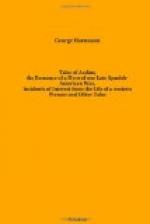“Although greatly disconcerted, Juan de Dios had to toe the mark. There was no alternative for him now, as I was desperate and my orders were obeyed to the letter, for death was the penalty for disobedience. The fight between the Mexican and the Indian ended by the Navajo, who was sorely wounded, throwing his knife into the heart of his enemy. It was a fair fight, although we accorded Juan de Dios, he being a Christian, this advantage against the Indian (who was better skilled in the use of weapons) that we allowed him to wrap his coat about his left arm as a shield, while the Indian was stripped to his patarague, or breechclout. We buried the body and allowed the Indian to shift for himself. I observed him crawling near the water’s edge in quest of herbs, which he masticated and applied to his wounds with an outer coating of mud from the banks of the stream. During the following night he disappeared. I suspect that the golden nuggets which caused all our troubles were taken from the body of a prospector who had been murdered in the lonesome mountains of Arizona.
“We allowed our horses several days’ rest to recuperate before starting on our return trip. You saw, senor, how we arrived. Starved, sore, and discouraged, we straggled home, jeered at and ridiculed by wiseacres who are always ready to say, ‘I told you so!’ and by enemies who had no liking for us. But the women, may Santa Barbara keep them virtuous! they who loved their husbands truly rejoiced to welcome us home, although we failed to bring them chispas de oro.
“As concerns the wife of Juan de Dios, and who was now his widow, pobrecita, she was not to be found at her home. She had taken advantage of her man’s absence to decamp to the mountain of Manzana with a strapping goat-herder, a very worthy young man, whom she loved and is now happily free to marry.”
CHAPTER VII. THE FIGHT IN THE SAND HILLS. THE PHANTOM DOG
A number of years had I lived with my relatives when uncle found it expedient to sell out his business. He had prospered wonderfully in his commercial ventures. Long since had his coffers absorbed most of the money circulating within his sphere of trade. Thereafter he accepted commercial paper in payment for merchandise, and trade grew immensely. Our customers soon learned how easy it was to affix their signatures to promissory notes and to mortgages on their lands or cattle, their horses, sheep, crops, and chattels. Of course there was a little interest to be paid on the indebtedness, but as it was merely a trifling one and a half per centum per month or eighteen per cent yearly, it was of no consequence. And it was so easy to pay your debts. Just think of it, people bought everything they needed and longed for at the store and paid for it by simply signing their names to several papers. When the day of payment came, they could liquidate their debts by renewing their obligations. They simply signed




